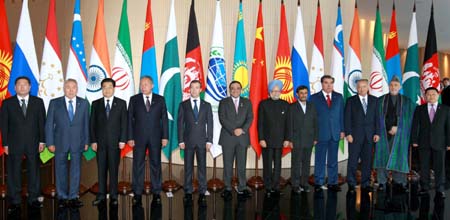|

|
| The leaders of Shanghai Cooperation Organization (SCO) member states and observer nations have a group photo taken with the leader of Afghanistan, a guest country of the SCO, in Yekaterinburg, Russia, on June 16, 2009. (Xinhua/Pang Xinglei) |
As an important member of the bloc, China participated in the summit in an active manner and played a unique role in it, Yang said.
In his important speech at the summit, Hu thoroughly analyzed new situations and challenges facing the SCO, pointing out that amid the global financial crisis, stepping up pragmatic cooperation and developing national strength are crucial guarantees for the member states to confront the crisis and prevent risks.
Hu urged the member states to consolidate confidence and support each other to jointly ride over the difficulties.
In his speech, Hu raised a five-point proposal of strengthening political mutual trust, deepening economic cooperation, intensifying security cooperation, expanding humanistic exchanges and keeping opening up to the rest of the world. The proposal served to point out the direction of the SCO's future development.
A series of important documents were signed and issued at the summit, including the Yekaterinburg Declaration and a joint communique. The leaders agreed to be committed to the Shanghai Spirit, comprehensively deepen cooperation in various fields and safeguard common interests of the member states and the region's safety and stability based on the principles and rules of the Treaty on Long-term Good-neighborly Relations.
Discussions on how to confront the global financial crisis was the key topic highlighted at the summit, said Yang.
In this regard, President Hu expounded key measures taken by the Chinese government to tackle the global financial crisis. Further more, he announced concrete steps to be taken by China to this end, such as providing a 10-billion-U.S. dollar loan for multilateral and bilateral economic and technological cooperation projects within the framework of the SCO, as well as sending trade and investment promotion delegations to other member states.
Security cooperation was the common concern of the SCO member states and a key cooperation field of the organization, Yang said.
A series of relevant documents were signed or approved by President Hu and other leaders, including the Counter-Terrorism Convention, the SCO Regulations on Political Diplomatic Measures and Mechanisms of Response to Events Jeopardizing Regional Peace, Security and Stability, as well as the Agreement Among the Governments of the SCO Member States on Cooperation in the Field of Ensuring International Information Security.
These documents served to improve the comprehensive security cooperation system of the SCO, and showed to the international community the SCO member states' determination and confidence to jointly combat the three evil forces of terrorism, separatism and extremism, as well as cross-border crimes, Yang said.
At the summit, President Hu also exchanged views with other leaders on the situation in Central Asia and Afghanistan, and discussed measures to solve global and regional issues.
On the sidelines of the summit, Hu met with Kyrgyz President Kurmanbek Bakiev, Tajik President Emomali Rakhmon, Uzbek President Islam Karimov, Indian Prime Minister Manmohan Singh, Iranian President Mahmoud Ahmadinejad and Pakistani President Asif Ali Zardari.
Hu reached important consensus with the leaders on developing bilateral ties and deepening mutually beneficial cooperation, which improved China's good-neighborly mutual trust and pragmatic cooperation with these countries.